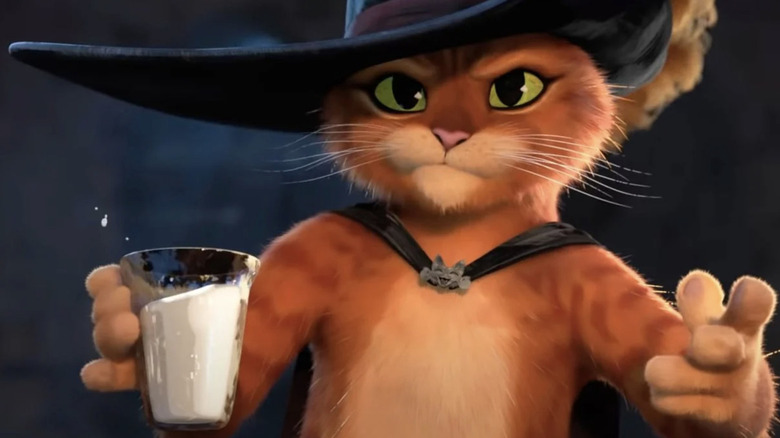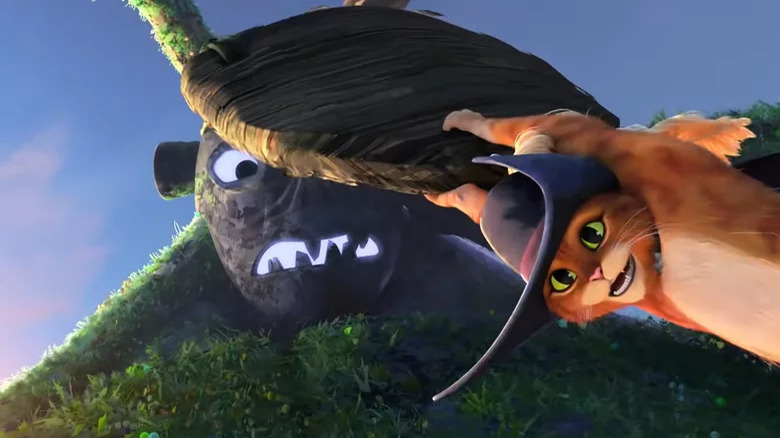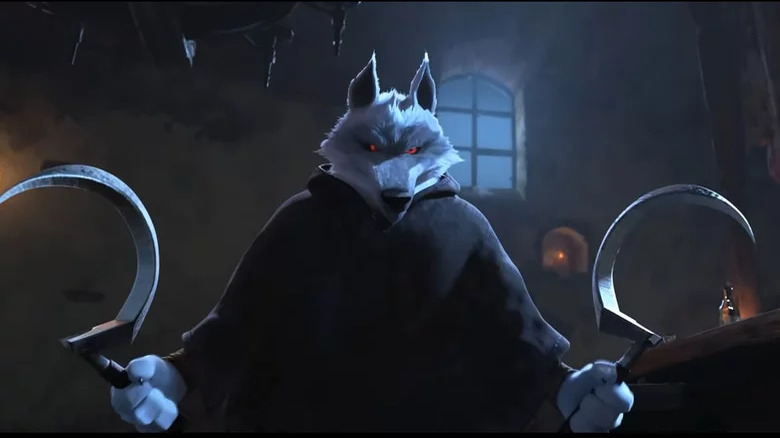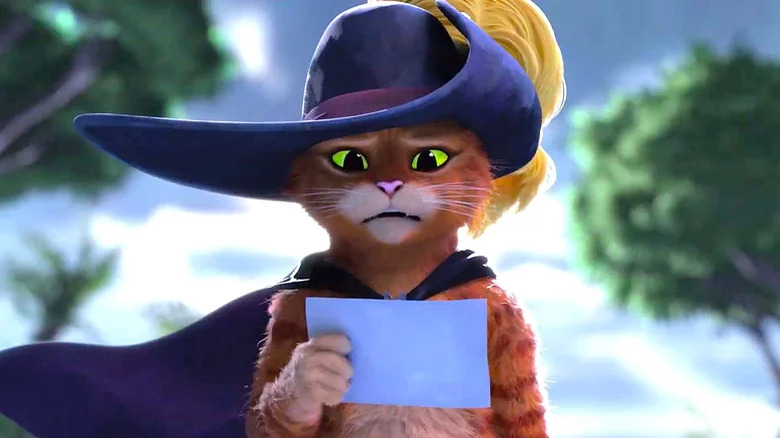Antonio Banderas Talks Puss In Boots: The Last Wish, Bilingual Performances, And More [Exclusive Interview]
2022 has truly been a great year for animation, from stop-motion making a comeback in films like Guillermo del Toro's "Pinocchio" and Henry Selick's "Wendell & Wild," to Pixar's "Turning Red" proving the studio is still willing to experiment, and Netflix's "The Sea Beast" giving us thrilling seafaring action.
Then there's DreamWorks Animation, a studio best known as "The House That Shrek Built." Though it started out quite promising, with some phenomenal films in the late '90s and early '00s, the past few years have seen the studio devote itself to seemingly endless sequels — some good, many rather mediocre.
That changed this year when DreamWorks released "The Bad Guys," a caper film with a delightfully stylized art style that mixed 3D and 2D. Now, the studio aims to repeat that success with "Puss in Boots: The Last Wish," a sequel a decade in the making. Shockingly, it's one of the best animated movies of the year, a delightfully funny and entertaining spaghetti western-inspired tale of an old fighter facing his own mortality, with its own set of stylized visuals.
Ahead of the film's wide release, /Film got the chance to talk to Puss in Boots himself, Antonio Banderas, about the mature tone of the film, adding some personal experiences to the performance, doing voice acting in both Spanish and English, and more.
During the interview, I introduced myself in Spanish to Banderas before proceeding to ask the first question in English, but the Academy Award-nominated actor seemingly ignored that last bit and continued the conversation fully in Spanish, so I had no choice to oblige; after all, there is no resisting Banderas' accent.
This interview has been translated from Spanish.
'I was surprised when I read the script and saw the story growing in the direction it went'
It's been a decade since the last movie. How was it to get back in the boots?
To tell you the truth, it's like no time had passed, like we had done the last recording session in Los Angeles last week. I've been doing this job since 2003 and it was just like I never stopped putting my headphones on and play, like no time had passed.
In terms of where Puss is in this film, it is a much darker and different place. Where did you find the inspiration to play Puss at the end of such a big journey?
Without being explicit, there certainly is a halo of current world situations, with the whole Covid topic, for example, and things that happened in my personal life like my heart attack, that sort of snuck into the character in a way. I don't know whether it was intentional or just by chance. So then I was surprised when I read the script and saw the story growing in the direction it went.
What happens when you do voice acting is that you do sessions with two, three, four scenes tops, which you record and send in. Then you stop for a while, and a few weeks later or a month later, you get another two sessions with a new section of the script. We work in pieces and then you revisit some of the scenes as they change and so on. This film grew a lot in the whole existentialism aspect of the character, in that we see him as a hero who is depressed, defeated, and thinking that life is pointless. We see Puss doing things we've never seen him do before, and then in a state of panic where he is vulnerable, he is hyperventilating, because he is literally being chased by death.
I think it is brilliantly done, because the audience we talk to, the kids who have been stuck at home for two years during the pandemic, going to schools with masks, vaccinating, thinking that outside their homes is an aggressive world threatening them and so on — so rather than turn our backs to that, the movie is confronting that situation directly with the audience, the whole theme of death. The movie, I think, puts value in life, places life as the biggest worth in existence.
'We had a lot of fun making ourselves laugh'
Of course, the film is not all gloom and doom. How do you find the humor in such a dark story?
For me, the humor comes from the moment Mama Luna enters the scene and Puss, who has decided to retire because obviously his heroic life puts [him] at real risk of dying, takes refuge with her. Puss' spirit goes against everything he has to do there, because he doesn't exactly live a cat's life. So he enters an almost depressive state, with the long beard he grows and a defeated outlook on things.
But then comes this dog who is very annoying and cannot stop being positive, and Puss has stopped being in a state of positivity. He just wants the dog to shut up and leave him alone, and that has a lot of humor. The cat and dog dynamic is very funny, and that made me laugh a lot because the dog is a great character.
We had a lot of fun making ourselves laugh during the recording sessions. That's always a good sign, because we work for hours there with just a microphone in front of you, repeating lines. So if we laugh, and the producers, and the director and the writers laugh, then we're creating this new thing that we ourselves find humorous, then I think we're on the right path.
You're one of few actors who perform the same character in both English and Spanish. Do you treat both performances differently? How do you deal with the adaptation from one to the other?
They are different for technical reasons. Notice that when I do the English voice, it is a free voice that is not attached to a drawing. The animation comes later. The cartoonists and animators are the ones that have to adapt the drawing to the voice. Once the footage has been edited and the parts of dialogue that are making it to the film have been locked in, then the process in the opposite. When I do the Spanish version, I have to adapt my lip sync to my English Puss.
And on top of that, I do it with a very strong Andaluz accent, a particular accent from a Málaga neighborhood called El Perchel, where we talk with a very strong and long "z," like a lisp. So then I also have to add expressions that are typical in the different Spanish-language markets, Mexico, Argentina, Peru, and they're all different. Sometimes we reach agreements so it is the same version for all markets, the same expressions, but some expressions, like "te va de madre" in Mexico, you cannot really adapt in Castillian Spanish because they make no sense.
Thinking bilingually
Do you think about your Spanish performance while doing the English version? Like, how certain lines will translate later?
Sometimes, yes. There are times where I go ahead and tell them, "This is not going to fully work in Spanish" and propose a different line that is doable on both languages. It's definitely happened. I cannot name a concrete example off the top of my head, but I can say that we've had debates about modifying the line that is already written in English so it can be adapted more easily in the Spanish dub.
These movies are famous for allowing a lot of improvisation. Is that something you're comfortable with? What is your approach to improv?
More than improvise, it is determining details in your own acting. The director asks you to say a line in a more specific way and I never say no to it, I always give them what they want. But then I do my own versions of how I interpret a scene and how I'd like it to be. So I do the line delivery in a different way. Then sometimes what we do is we talk about what we're doing, and they modify certain predetermined aspects of the character and the script according to the conversations we had.
Remember that the writers, the director, and certain producers also come to the recording sessions, so there's a lot of people and a lot of opinions, but there tends to be a consensus, and that leads where the character goes.
"Puss in Boots: The Last Wish" arrives in theaters on December 21, 2022.



